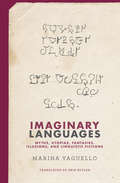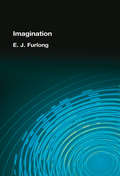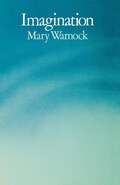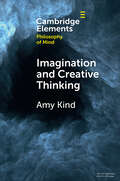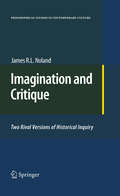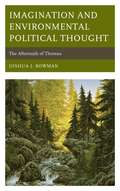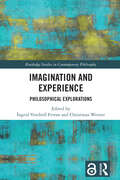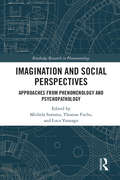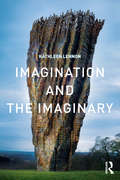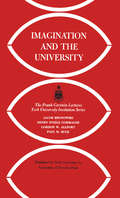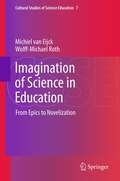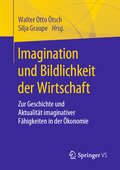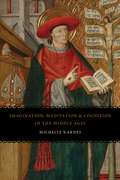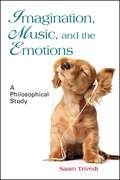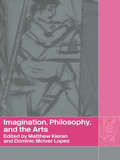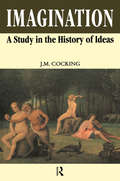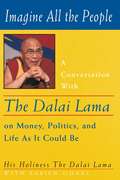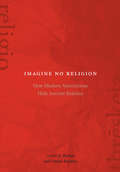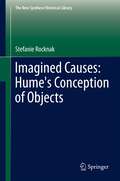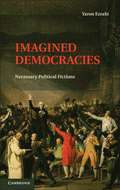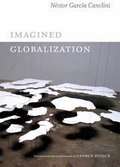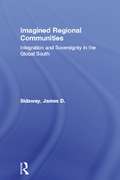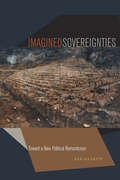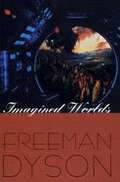- Table View
- List View
Imaginary Languages: Myths, Utopias, Fantasies, Illusions, and Linguistic Fictions
by Marina YaguelloAn exploration of the practice of inventing languages, from speaking in tongues to utopian schemes of universality to the discoveries of modern linguistics.In Imaginary Languages, Marina Yaguello explores the history and practice of inventing languages, from religious speaking in tongues to politically utopian schemes of universality to the discoveries of modern linguistics. She looks for imagined languages that are autonomous systems, complete unto themselves and meant for communal use; imaginary, and therefore unlike both natural languages and historically attested languages; and products of an individual effort to lay hold of language. Inventors of languages, Yaguello writes, are madly in love: they love an object that belongs to them only to the extent that they also share it with a community. Yaguello investigates the sources of imaginary languages, in myths, dreams, and utopias. She takes readers on a tour of languages invented in literature from the sixteenth to the twentieth century, including that in More&’s Utopia, Leibniz&’s &“algebra of thought,&” and Bulwer-Lytton&’s linguistic fiction. She examines the linguistic fantasies (or madness) of Georgian linguist Nikolai Marr and Swiss medium Hélène Smith; and considers the quest for the true philosophical language. Yaguello finds two abiding (and somewhat contradictory) forces: the diversity of linguistic experience, which stands opposed to unifying endeavors, and, on the other hand, features shared by all languages (natural or not) and their users, which justifies the universalist hypothesis. Recent years have seen something of a boom in invented languages, whether artificial languages meant to facilitate international communication or imagined languages constructed as part of science fiction worlds. In Imaginary Languages (an updated and expanded version of the earlier Les Fous du langage, published in English as Lunatic Lovers of Language), Yaguello shows that the invention of language is above all a passionate, dizzying labor of love.
Imagination
by E. J. FurlongFirst published in 2002. Routledge is an imprint of Taylor & Francis, an informa company.
Imagination
by Mary WarnockImagination is an outstanding contribution to a notoriously elusive and confusing subject. It skillfully interrelates problems in philosophy, the history of ideas and literary theory and criticism, tracing the evolution of the concept of imagination from Hume and Kant in the eighteenth century to Ryle, Sartre and Wittgenstein in the twentieth. She strongly belies that the cultivation of imagination should be the chief aim of education and one of her objectives in writing the book has been to put forward reasons why this is so. Purely philosophical treatment of the concept is shown to be related to its use in the work of Coleridge and Wordsworth, who she considers to be the creators of a new kind of awareness with more than literary implications. The purpose of her historical account is to suggest that the role of imagination in our perception and thought is more pervasive than may at first sight appear, and that the thread she traces is an important link joining apparently different areas of our experience. She argues that imagination is an essential element in both our awareness of the world and our attaching of value to it.
Imagination and Creative Thinking (Elements in Philosophy of Mind)
by Amy KindThis Element explores the nature of both imagination and creative thinking in an effort to understand the relation between them and also to understand their role in the vast array of activities in which they are typically implicated, from art, music, and literature to technology, medicine, and science. Focusing on the contemporary philosophical literature, it will take up several interrelated questions: What is imagination, and how does it fit into the cognitive architecture of the mind? What is creativity? Is imagination required for creativity? Is creativity required for imagination? Is a person simply born either imaginative or not (and likewise, either creative or not), or are imagination and creativity skills that can be cultivated? And finally, are imagination and creativity uniquely human capacities, or can they be had by nonbiological entities such as AI systems?
Imagination and Critique
by James R. NolandThis project is the result of a philosopher's extended engagement with the literature and practice of political science and public policy formation. One finds in these fields, and in social science generally, two fundamentally opposed approaches to inquiry into the nature and cause of historical political events. These two approaches, which are sometimes employed simultaneously, are both powerful and persuasive. Yet, the two accounts are incompatible and comprehensive. Making a choice between the two is not simply about choosing a view of history; the choice affects how one anticipates policy developments in the future, and, more importantly, how one seeks to influence and shape public policy now and in the years to come. Because there is no external standard of history by which to judge them, one must examine the conceptions of human nature, reason and freedom underlying each in order to adjudicate between the two. Following Alasdair MacIntyre's approach in Three Rival Versions of Moral Inquiry, this book analyzes and evaluates the internal coherence and ultimate viability of the two fundamental versions of historical inquiry. Intended not only for philosophers but also for students and practitioners of political science and public policy, the book includes a case study of a particularly significant political development in U.S. history- the ratification of the 16th Amendment- and suggests some specific implications of the philosophical conclusions.
Imagination and Environmental Political Thought: The Aftermath of Thoreau (Politics, Literature, and Film)
by Joshua J. Bowman<p>Imagination and Environmental Political Thought: The Aftermath of Thoreau seeks to correct oversimplified readings of Henry David Thoreau’s political thought by elucidating a key tension within his imagination. With the celebration of Thoreau’s two-hundredth birthday now past, this study outlines, and builds on, his own understanding of imagination and considers its implications for environmental politics. Despite the use of the word, “aftermath,” Thoreau’s legacy for environmental political thought is primarily constructive and foundational for modern environmentalism. <p>Thoreau’s virtues and vices have been inherited by his environmentally-conscious readers. The author of Walden’s preference for an abstract, ahistorical “higher law,” his radical concept of autonomy, and his frustration with government and community foster an impractical political thought characteristic of an idyllic imagination. Nevertheless, Thoreau demonstrates a more prudential and moral imagination by emphasizing the inescapable relationship between the moral order of individuals and the order of political communities and by pioneering the central questions of humanity’s relationship to non-human nature. Can this tension of imaginations be resolved? What are the consequences of this tension? <p>Thoreau’s overall vision ultimately creates significant problems with which environmentalists still struggle. While Thoreau’s emphasis on freedom and the immaterial aspects of human and non-human nature are of considerable value, his abstract political morality, misanthropy and escapism must be resisted both for the sake of environmental well-being and human dignity. <p>In addition, this book is an exercise in re-thinking how the humanities may provide scholars critical insights to better diagnose and respond to the environmental challenges of our time.</p>
Imagination and Experience: Philosophical Explorations (Routledge Studies in Contemporary Philosophy)
by Íngrid Vendrell Ferran Christiana WernerThis volume brings together two philosophical research areas that have been subject to increased attention: work regarding the unique character of having an experience and studies on the nature and powers of imagination. The importance of imagination seems to stand in tension with the assumed unique and irreplaceable role of experience in our lives. However, new arguments in various philosophical debates suggest that there is a need to examine how both areas of research interrelate and can enrich one another. The chapters in this volume examine whether the traditional accounts of experience and imagination need to be challenged. They are divided into thematic sections that discuss epistemological, ontological, normative, phenomenological, and intersubjective questions related to experience and imagination.Imagination and Experience is an essential resource for scholars and advanced students working in philosophy of mind, epistemology, ethics, aesthetics, and philosophy of psychology.
Imagination and Invention (Univocal)
by Gilbert SimondonA radical rethinking of the theory and the experience of mental images Here, in English translation for the first time, is Gilbert Simondon&’s fundamental reconception of the mental image and the theory of imagination and invention. Drawing on a vast range of mid-twentieth-century theoretical resources—from experimental psychology, cybernetics, and ethology to the phenomenological reflections of Sartre and Merleau-Ponty—Imagination and Invention provides a comprehensive account of the mental image and adds a vital new dimension to the theory of psychical individuation in Simondon&’s earlier, highly influential work.Simondon traces the development of the mental image through four phases: first a bundle of motor anticipations, the image becomes a cognitive system that mediates the organism&’s relation to its milieu, then a symbolic and abstract integration of motor and affective experience to, finally, invention, a solution to a problem of life that requires the externalization of the mental image and the creation of a technical object. An image cannot be understood from the perspective of one phase alone, he argues, but only within the trajectory of its progressive metamorphosis.
Imagination and Social Perspectives: Approaches from Phenomenology and Psychopathology (Routledge Research in Phenomenology)
by Thomas Fuchs Michela Summa Luca VanzagoOur experience of other individuals as minded beings goes hand in hand with the awareness that they have a unique epistemic and emotional perspective on the experienced objects and situations. The same object can be seen from many different points of view, an event can awaken different emotional reactions in different individuals, and our position-takings can in part be mediated by our belonging to some social or cultural groups. All these phenomena can be described by referring to the metaphor of perspective. Assuming that there are different, and irreducible, perspectives we can take on the experienced world, and on others as experiencing the same world, the phenomenon of mutual understanding can consistently be understood in terms of perspectival flexibility. This edited volume investigates the different processes in which perspectival flexibility occurs in social life and particularly focuses on the constitutive role of imagination in such processes. It includes original works in philosophy and psychopathology showing how perspectival flexibility and social cognition are grounded on the interplay of direct perception and imagination.
Imagination and the Imaginary
by Kathleen LennonThe concept of the imaginary is pervasive within contemporary thought, yet can be a baffling and often controversial term. In Imagination and the Imaginary, Kathleen Lennon explores the links between imagination - regarded as the faculty of creating images or forms - and the imaginary, which links such imagery with affect or emotion and captures the significance which the world carries for us. Beginning with an examination of contrasting theories of imagination proposed by Hume and Kant, Lennon argues that the imaginary is not something in opposition to the real, but the very faculty through which the world is made real to us. She then turns to the vexed relationship between perception and imagination and, drawing on Kant, Merleau-Ponty and Sartre, explores some fundamental questions, such as whether there is a distinction between the perceived and the imagined; the relationship between imagination and creativity; and the role of the body in perception and imagination. Invoking also Spinoza and Coleridge, Lennon argues that, far from being a realm of illusion, the imaginary world is our most direct mode of perception. She then explores the role the imaginary plays in the formation of the self and the social world. A unique feature of the volume is that it compares and contrasts a philosophical tradition of thinking about the imagination - running from Kant and Hume to Strawson and John McDowell - with the work of phenomenological, psychoanalytic, poststructuralist and feminist thinkers such as Merleau-Ponty, Sartre, Lacan, Castoriadis, Irigaray, Gatens and Lloyd. This makes Imagination and the Imaginary essential reading for students and scholars working in phenomenology, philosophy of perception, social theory, cultural studies and aesthetics. Cover Image: Bronze Bowl with Lace, Ursula Von Rydingsvard, 2014. Courtesy the artist, Galerie Lelong and Yorkshire Sculpture Park. Photo Jonty Wilde.
Imagination and the University
by Henry Steele Commager Gordon W. Allport Jacob Bronowski Paul H. BuckThis volume, the Frank Gerstein Lectures for 1963, is the second series of Invitation Lectures to be delivered at York University. The theme "Imagination and the University" was appropriate for, as President Murray Ross states in this Foreword, it is in its early years that a university is sufficiently flexible to utilize imagination in its structure and in its curriculum. York University was in its third year when the Lectures were given.Four distinguished scholars present their views on the importance of an imaginative approach to the different academic disciplines, and to the conduct of life in contemporary society as a whole.Jacob Bronowski, speaking on Imagination in Art and Science, draws a clear and striking analogy between the role of imagination in mathematics and in poetry, drawing on his own experiences and contributions in both areas. He stresses that all creative works in art or science, must conform to the universal experience of mankind and to the private experiences of each man: the work of science, as of art, moves us profoundly, in mind and in emotion, when it matches our experience and at the same time points beyond it.Henry Steele Commager shows how important is the contribution to be made by an imaginative approach to politics, where, as in other fields of human experience, it must not be separated from reality, if it is to find expression in something more than words. He points to examples from the past and the present and asks for more imagination in public thinking, it fit our actions to the reality of change, citing the urgency of such twentieth-century phenomena as the status of Communist China, the predicted population explosion, and the threat of nuclear war. Professor Commager believes that the universities provide the key to this kind of approach, being a supreme example of the creative capacity of mankind, whose function it is to serve the commonwealth of learning.A different kind of insight is offered by Gordon W. Allport, whose subject is Imagination in Psychology. He believes that the present "impertinence" of psychology can best be cured by endowing it with more imagination. He demands a pluralistic approach to psychological investigation, which would not deny the insights yielded by traditional methods, with their characteristic minute analyses, but whose goal would be to fashion a conception of the human person that would exclude nothing that is valid, and at the same time preserve an ideal of rational consistency. This could lead, in turn, to a clear definition of the root motives of mankind, even to discovering new formulas for international peace by offsetting particularistic political demands. Finally, Paul H. Buck describes the Harvard House Plan as an example of Imagination and the Curriculum. This plan, modelled on the Oxford-Cambridge College system which is also followed in some Canadian universities, is an attempt to make all aspects of undergraduate life a process of education. And a truly liberal education for today and tomorrow, Professor Buck is confident, will combine a programme of general education, a programme of specialism, and a collegiate way of living.
Imagination of Science in Education
by Wolff-Michael Roth Michiel Van EijckResearchers agree that schools construct a particular image of science, in which some characteristics are featured while others end up in oblivion. The result is that although most children are likely to be familiar with images of heroic scientists such as Einstein and Darwin, they rarely learn about the messy, day-to-day practice of science in which scientists are ordinary humans. Surprisingly, the process by which this imagination of science in education occurs has rarely been theorized. This is all the more remarkable since great thinkers tend to agree that the formation of images -- imagination -- is at the root of how human beings modify their material world. Hence this process in school science is fundamental to the way in which scientists, being the successful agents in/of science education, actually create their own scientific enterprise once they take up their professional life. One of the first to examine the topic, this book takes a theoretical approach to understanding the process of imagining science in education. The authors utilize a number of interpretive studies in both science and science education to describe and contrast two opposing forces in the imagination of science in education: epicization and novelization. Currently, they argue, the imagination of science in education is dominated by epicization, which provides an absolute past of scientific heroes and peak discoveries. This opens a distance between students and today's scientific enterprises, and contrasts sharply with the wider aim of science education to bring the actual world of science closer to students. To better understand how to reach this aim, the authors offer a detailed look at novelization, which is a continuous renewal of narratives that derives from dialogical interaction. The book brings together two hitherto separate fields of research in science education: psychologically informed research on students' images of science and semiotically informed research on images of science in textbooks. Drawing on a series of studies in which children participate in the imagination of science in and out of the classroom, the authors show how the process of novelization actually occurs in the practice of education and outline the various images of science this process ultimately yields.
Imagination und Bildlichkeit der Wirtschaft: Zur Geschichte und Aktualität imaginativer Fähigkeiten in der Ökonomie
by Walter Otto Ötsch Silja GraupeDer vorliegende Band stellt ein erstes Grundlagenwerk zur Imaginationsforschung in der Ökonomie dar. Er erforscht die ökonomische Theoriegeschichte (auch mit Bezug auf die Philosophiegeschichte) und fragt, welche Bilder und Selbstbilder über Menschen, über das wirtschaftliche System und über die Zukunft in ökonomischen Theorien enthalten sind. Wie ist die Beschäftigung mit Imaginationen im Mainstream der Wirtschaftswissenschaften verloren gegangen und wie kann sie wiederbelebt werden?Prof. Dr. Walter Otto Ötsch ist Professor für Ökonomie und Kulturgeschichte an der Cusanus Hochschule für Gesellschaftsgestaltung.Prof. Dr. Silja Graupe ist Professorin für Ökonomie und Philosophie und Leiterin des Instituts für Ökonomie der Cusanus Hochschule für Gesellschaftsgestaltung.
Imagination, Meditation, and Cognition in the Middle Ages
by Michelle KarnesIn Imagination, Meditation, and Cognition in the Middle Ages, Michelle Karnes revises the history of medieval imagination with a detailed analysis of its role in the period's meditations and theories of cognition. Karnes here understands imagination in its technical, philosophical sense, taking her cue from Bonaventure, the thirteenth-century scholastic theologian and philosopher who provided the first sustained account of how the philosophical imagination could be transformed into a devotional one. Karnes examines Bonaventure's meditational works, the Meditationes vitae Christi, the Stimulis amoris, Piers Plowman, and Nicholas Love's Myrrour, among others, and argues that the cognitive importance that imagination enjoyed in scholastic philosophy informed its importance in medieval meditations on the life of Christ. Emphasizing the cognitive significance of both imagination and the meditations that relied on it, she revises a long-standing association of imagination with the Middle Ages. In her account, imagination was not simply an object of suspicion but also a crucial intellectual, spiritual, and literary resource that exercised considerable authority.
Imagination, Music, and the Emotions: A Philosophical Study
by Saam TrivediBoth musicians and laypersons can perceive purely instrumental music without words or an associated story or program as expressing emotions such as happiness and sadness. But how? In this book, Saam Trivedi discusses and critiques the leading philosophical approaches to this question, including formalism, metaphorism, expression theories, arousalism, resemblance theories, and persona theories. Finding these to be inadequate, he advocates an "imaginationist" solution, by which absolute music is not really or literally sad but is only imagined to be so in a variety of ways. In particular, he argues that we as listeners animate the music ourselves, imaginatively projecting life and mental states onto it. Bolstering his argument with empirical data from studies in neuroscience, psychology, and cognitive science, Trivedi also addresses and explores larger philosophical questions such as the nature of emotions, metaphors, and imagination.
Imagination, Philosophy and the Arts
by Matthew Kieran Dominic McIver LopesImagination, Philosophy and the Arts is the first comprehensive collection of papers by philosophers examining the nature of imagination and its role in understanding and making art.Imagination is a central concept in aesthetics with close ties to issues in the philosophy of mind and the philosophy of language, yet it has not received the kind of sustained, critical attention it deserves. This collection of seventeen brand new essays critically examines just how and in what form the notion of imagination illuminates fundamental problems in the philosophy of art.
Imagination: A Study in the History of Ideas
by John Cocking"First Published in 1991, Routledge is an imprint of Taylor & Francis, an informa company."
Imagine All the People: A Conversation with the Dalai Lama on Money, Politics, and Life As It Could Be
by His Holiness the Dalai Lama Anne Benson Fabien OuakiIf you could sit down with the Dalai Lama and talk with him about anything, what would you discuss? Fabien Ouaki, a prominent French businessman, was granted such an opportunity and asked the Dalai Lama for his thoughts on the everyday issues that fill our newspapers and our lives. This is the record of these varied and remarkable conversations. Covered are a wide spectrum of topics - political, social, personal and spiritual - including the media and education, marriage and sex, and disarmament and compassion. Blessed by His Holiness' buoyant and insightful thoughts, Imagine All the People allows readers to glimpse the spontaneous workings of an extraordinary mind at once of - and above - this world. Includes the full text of The Global Community and the Need for Universal Responsibility.If you could sit down with the Dalai Lama and talk with him about anything, what would you discuss? Fabien Ouaki, a prominent French businessman, was granted such an opportunity and asked the Dalai Lama for his thoughts on the everyday issues that fill our newspapers and our lives. This is the record of these varied and remarkable conversations. Covered are a wide spectrum of topics - political, social, personal and spiritual - including the media and education, marriage and sex, and disarmament and compassion. Blessed by His Holiness' buoyant and insightful thoughts, Imagine All the People allows readers to glimpse the spontaneous workings of an extraordinary mind at once of - and above - this world. Includes the full text of The Global Community and the Need for Universal Responsibility.
Imagine No Religion: How Modern Abstractions Hide Ancient Realities
by Daniel Boyarin Carlin A. BartonWhat do we fail to see when we force other, earlier cultures into the Procrustean bed of concepts that organize our contemporary world? In Imagine No Religion, Carlin A. Barton and Daniel Boyarin map the myriad meanings of the Latin and Greek words religio and thrēskeia, frequently and reductively mistranslated as “religion,” in order to explore the manifold nuances of their uses within ancient Roman and Greek societies. In doing so, they reveal how we can conceptualize anew and speak of these cultures without invoking the anachronistic concept of religion. From Plautus to Tertullian, Herodotus to Josephus, Imagine No Religion illuminates cultural complexities otherwise obscured by our modern-day categories.
Imagined Causes: Hume's Conception of Objects
by Stefanie RocknakThis book provides the first comprehensive account of Hume's conception of objects in Book I of A Treatise of Human Nature. What, according to Hume, are objects? Ideas? Impressions? Mind-independent objects? All three? None of the above? Through a close textual analysis, Rocknak shows that Hume thought that objects are imagined ideas. But, she argues, he struggled with two accounts of how and when we imagine such ideas. On the one hand, Hume believed that we always and universally imagine that objects are the causes of our perceptions. On the other hand, he thought that we only imagine such causes when we reach a "philosophical" level of thought. This tension manifests itself in Hume's account of personal identity; a tension that, Rocknak argues, Hume acknowledges in the Appendix to the Treatise. As a result of Rocknak's detailed account of Hume's conception of objects, we are forced to accommodate new interpretations of, at least, Hume's notions of belief, personal identity, justification and causality.
Imagined Democracies
by Yaron EzrahiThis book proposes a revisionist approach to democratic politics. Yaron Ezrahi focuses on the creative unconscious collective imagination that generates ever-changing visions of legitimate power and authority, which compete for enactment and institutionalization in the political arena. If, in the past, political authority was grounded in fictions such as the divine right of kings, the laws of nature, historical determinism and scientism, today the space of democratic politics is filled with multiple alternative social imaginaries of the desirable political order. Exposure to electronic mass media has made contemporary democratic publics more aware that credible popular fictions have greater impact on shaping our political realities than do rational social choices or moral arguments. The pressing political question in contemporary democracy is, therefore, how to select and enact political fictions that promote peace and how to found the political order on checks and balances between alternative political imaginaries of freedom and justice.
Imagined Globalization
by George Yúdice Néstor García CancliniA leading figure in cultural studies worldwide, Néstor García Canclini is a Latin American thinker who has consistently sought to understand the impact of globalization on the relations between Latin America, Europe, and the United States, and among Latin American countries. In this book, newly available in English, he considers how globalization is imagined by artists, academics, migrants, and entrepreneurs, all of whom traverse boundaries and, at times, engage in conflicted or negotiated multicultural interactions.García Canclini contrasts the imaginaries of previous migrants to the Americas with those who live in transnational circuits today. He integrates metaphor and narrative, working through philosophical, anthropological, and socioeconomically grounded interpretations of art, literature, crafts, media, and other forms of expression toward his conclusion that globalization is, in important ways, a collection of heterogeneous narratives. García Canclini advocates global imaginaries that generate new strategies for dealing with contingency and produce new forms of citizenship oriented toward multiple social configurations rather than homogenization. This edition of Imagined Globalization includes a significant new introduction by George Yúdice and an interview in which the cultural theorist Toby Miller and García Canclini touch on events including the Arab Spring and Occupy Wall Street.
Imagined Regional Communities: Integration and Sovereignty in the Global South (Routledge Studies in Human Geography #Vol. 5)
by James D. SidawayImagined Regional Communities provides an original approach to thinking about the processes of regional integration. Focusing mostly on communities in Africa, Asia and Latin America, it develops detailed case studies based on archives, interviews and critical readings of existing texts. These case-studies are related to each other and the overall themes of the book, so that a set of narratives and theoretical elaborations emerge, that critically reformulate understandings of regional communities, statehold and sovereignty.
Imagined Sovereignties: Toward a New Political Romanticism
by Kir KuikenImagined Sovereignties argues that the Romantics reconceived not just the nature of aesthetic imagination but also the conditions in which a specific form of political sovereignty could be realized through it.Articulating the link between the poetic imagination and secularized sovereignty requires more than simply replacing God with the subjective imagination and thereby ratifying the bourgeois liberal subject. Through close readings of Blake, Coleridge, Wordsworth, and Shelley, the author elucidates how Romanticism’s reassertion of poetic power in place of the divine sovereign articulates an alternative understanding of secularization in forms of sovereignty that are no longer modeled on transcendence, divine or human.These readings ask us to reexamine not only the political significance of Romanticism but also its place within the development of modern politics. Certain aspects of Romanticism still provide an important resource for rethinking the limits of the political in our own time. This book will be a crucial source for those interested in the political legacy of Romanticism, as well as for anyone concerned with critical theoretical approaches to politics in the present.
Imagined Worlds (Jerusalem-Harvard Lectures)
by Freeman DysonImagine a world where whole eons will pass, cultures rise and fall, between a telephone call and its reply. Think of the human race multiplying 500-millionfold or evolving new, unique species. Consider the technology of space colonization, computer-assisted reproduction, the "Martian potato." One hundred years after H. G. Wells visited the future in "The Time Machine," Freeman Dyson marshals his uncommon gifts as a scientist and storyteller to take us once more to such worlds, which may or may not be in our future.
